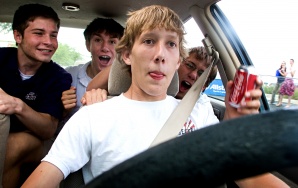Inexperience and inadequate training
Driving is a highly complex, life-and-death task. Learning to OPERATE a car is easy. Learning to process complex information (traffic, signage, road features, etc.) is difficult and takes a lot of practice. This complex task is mostly taught by parents, most of who are neither professional driving instructors or professional educators. As a result, many teens are not adequately trained to drive.
Teenager passengers in the car
The effects of having passengers in the car on safe driving is quite different for adult versus teen drivers. Unlike adult drivers, teenagers’ risks of dying in a motor vehicle are dramatically increased by the presence of teenage passengers.
Seat Belts
Teens are less likely to wear seat belts, particularly as passengers in back seats.
Alcohol
Of course, drinking and driving is dangerous and reckless behavior at any age. However, alcohol impairs the driving of teenagers even more than it does the driving of adults.
Sleep
Most teenagers do not get enough sleep. They are sleep-deprived as a group. Sleep-deprivation greatly impairs the ability to drive safely. Teens and college students are the age group most likely to fall asleep at the wheel. However, when a driver is sleep-deprived, even if he or she never falls asleep at the wheel, the cognitive, sensory, and perceptual effects of sleep-deprivation interfere with the ability to drive safely.
Distracted Driving
This is perhaps the most talked-about risk factor for teen drivers. Truthfully, distracted driving is a major issue for ALL drivers. The use of various devices while driving: cell phones, GPS systems, car audio systems, all have a major influence on the likelihood of car crashes.
NEXT: What a Parent Can Do
